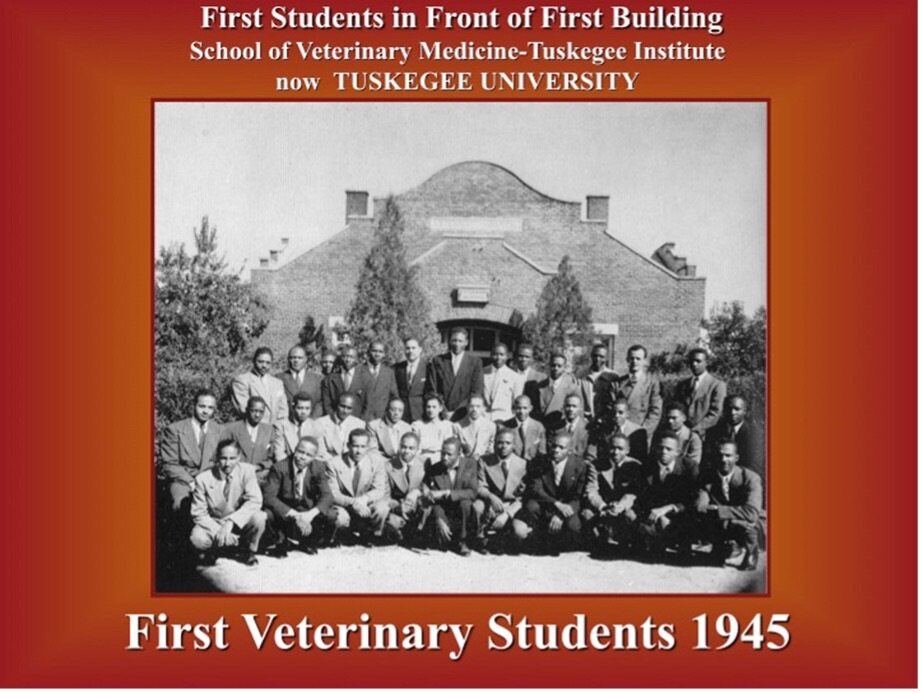

The Tuskegee University College of Veterinary Medicine (TUCVM) is the first veterinary medical professional program located on the campus of a historically black college or university (HBCU) in the United States. There are over 127,000 veterinarians in the U.S., 2% are African Americans, and of that 2%. 70% graduated from Tuskegee University. The TUCVM is recognized as the most diverse of all schools/colleges of veterinary medicine in the U.S. The primary mission of the TUCVM is to provide an environment that fosters a spirit of active, independent and self-directed learning, intellectual curiosity, creativity, critical thinking, problem solving, ethics, and leadership; and promotes teaching, research and service in veterinary medicine and related disciplines.
The TUCVM (formerly the School of Veterinary Medicine) was envisioned by Dr. Frederick Douglas Patterson in 1944. Dr. Patterson founded the United Negro College Fund (UNCF) that even today serves as an excellent example of far-reaching, consequential engagement across the U.S. The TUCVM was established in 1945 to train and educate African Americans at a time when opportunities to study veterinary medicine due to segregation and other racial impediments did not exist. At that time, the TUCVM was one of 10 veterinary schools in the U.S., and it is estimated that there were fewer than five African American veterinarians in the South.
The first graduates of five included one female that completed the program with the DVM degree in 1949. Although the first veterinary class in 1945 contained students who were exclusively African Americans, significant strides have been made over the years to become the most diverse and inclusive veterinary school in the U.S., which has served a singular role in expanding diversity in the veterinary profession. The focus of the college is to be inclusive and play a significant role in educating minorities and underrepresented populations needed to address the growing veterinary needs in a diverse national and global population.
Since its inception, the TUCVM has graduated nearly 3,200 veterinary medical graduates. The college currently accepts 65 students per year in the incoming class. As with the students, the faculty of educators and researchers are also diverse with national and international expertise. In the basic sciences component of the program, 75 percent of faculty members hold both the DVM and Ph.D. degrees, and the clinical faculty include educators trained in various specialty disciplines and with board certifications.
The college is comprised of professional and graduate programs. The TUCVM offers the professional degree of Doctor of Veterinary Medicine (DVM), the Doctor of Philosophy (Ph.D.) in Interdisciplinary Pathobiology (IDPB) and Integrative Biosciences (IBS). The Ph.D. in IBS is also a shared degree program among the TUCVM; the College of Agriculture, Environment and Nutrition Sciences; and the College of Arts and Sciences. The College also offers the Master’s degree in Veterinary Science and the Master of Public Health (MPH). The Graduate Public Health program was accredited with the Council on Education for Public Health (CEPH) in 2022. The college holds 7 U.S. patents with 2 for time-saving technologies to detect multiple foodborne and biothreat pathogens in food items through the research efforts in the Center of Food Animal Health, Food Safety, and Food Defense and 1 in collaboration with engineering faculty for nanomaterial-based films in food packaging applications.
The veterinary medical graduates of the TUCVM are engaged as leaders in various aspects of the veterinary profession. Leadership roles include current president and past presidents and vice-president of the American Veterinary Medical Association (AVMA); past presidents of the American Association of Veterinary Medical Colleges (AAVMC), leadership roles in state veterinary medical associations; deans and associate deans of veterinary schools/colleges; leadership roles in the government such as the United States Department of Agriculture (APHIS and FSIS), Centers for Disease Control (CDC), and Food and Drug Administration (FDA). TUCVM veterinary medical graduates are also engaged in agencies that promote funding for health and biomedical research, other public health agencies, and the military services; key positions in organizations that promote veterinary medical education, and experts in biomedical research and leaders in the pharmaceutical industry. Our veterinary medical graduates continue to make contributions to promoting animal welfare; advancing the veterinary profession through education and research; and providing an avenue for the new veterinary professionals to continue the Tuskegee legacy.
The Tuskegee University College of Veterinary Medicine will continue to remain vibrant and engaged as one of the national and global veterinary schools/colleges in the Association of American Veterinary Medical Colleges (AAVMC) that provides leadership for and promotes excellence in academic veterinary medicine. The College also remains vigilant to continue to carry the banner of the organization that represents our profession, the American Veterinary Medical Association (AVMA) to protect, promote, and advance a strong and unified veterinary profession that meets the needs of society; and advance the science and practice of veterinary medicine to improve animal and human health.



